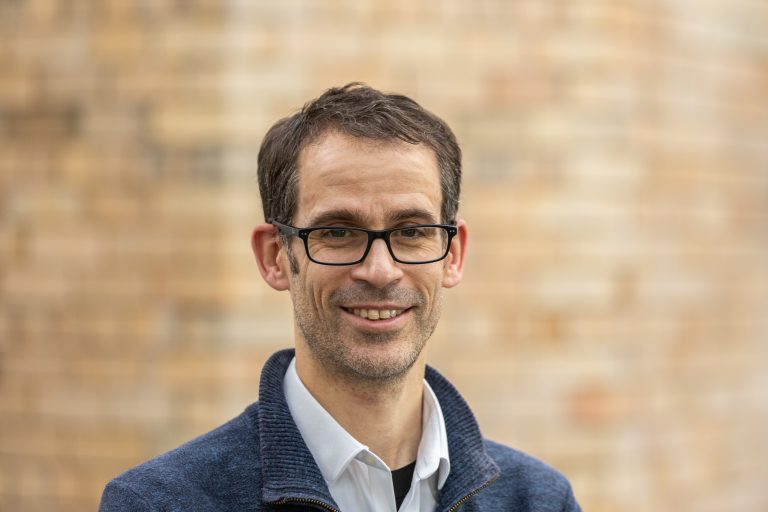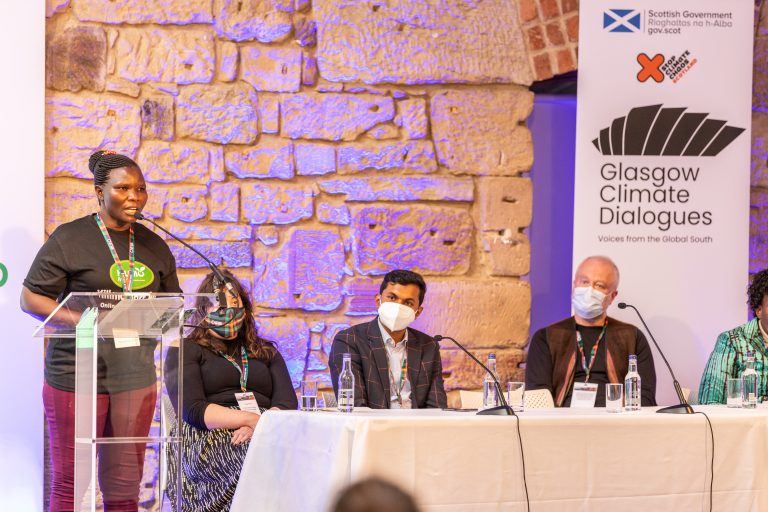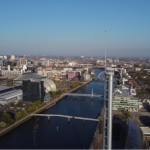
By Jamie Livingstone, Head of Oxfam Scotland
“Climate, food and women are a family of three. When one is affected, the others are too”, said Masudio Margaret Eberu, a smallholder farmer who has travelled from the fields of Uganda to the conference floor of COP26 in Glasgow.
“We are mothers. When we say that climate change is affecting us so much, people should listen and take action. If you don’t take action, who will feed the families? Who will feed the nations? Who will feed the world?”
Margaret was speaking yesterday at an event, co-hosted by Stop Climate Chaos Scotland and the Scottish Government in the heart of the official Blue Zone of the UN climate talks.
And her message was clear: “The effects of climate change should be financed and be a priority. Our voices must be heard.”

Margaret’s call came on the eve of the Climate Finance themed day at COP26. This term refers to the money promised to low-income, climate vulnerable countries by rich, developed countries who got rich by burning fossil fuels, creating the climate crisis.
Back in 2009, rich countries made a legal promise to the least developed countries to mobilise $100 billion per year by 2020 to help them adapt to climate impacts – like droughts, and floods – and to cut their own emissions.
Even at the time, this goal was insufficient, but the commitment is the glue that holds the entire Paris Agreement together. Right now, it’s coming badly unstuck.
In 2019, only $80 billion was mobilised and, based on current plans, rich countries won’t achieve the $100 billion target until 2023 – three years late. It means rich countries look set to short-change those on the climate frontlines by tens of billions of dollars by 2025.
But as well as the quantity of money, how this climate finance promise is delivered matters hugely too. In 2019, some 70% of public climate finance came in the form of loans, not grants.
At the same time, too many rich countries are simply rebadging existing development budgets to climate finance, robbing schools and hospitals in developing countries to pay for the new and additional impacts of the climate crisis.
Importantly, only a quarter of the money mobilised so far was focused on supporting communities to adapt, despite the escalating climate impacts from the world’s failure to slash emissions at the speed and depth needed.
Rich countries cannot simply sweep their broken climate finance promises under the carpet and expect there to be trust, and the growing dismay of small island states at these failures has become increasingly obvious.
The Seychelles has said they’re “gasping for survival”, with Fiji warning that the world’s richest nations “have buckets but are wilfully ignoring the storms on the horizon and the holes in our canoe”.
In the recent Glasgow Climate Dialogues, a series of discussions hosted by SCCS and the Scottish Government, experts from across the Global South called for rich nations to right this flagrant wrong, while also making progress towards a new, much more stretching, public climate finance goal for after 2025. After all, climate impacts are growing fast.
And to ensure communities get the help they need to adapt, as well as to reduce their own emissions, it also called for COP26 to agree a new dedicated sub-goal for public finance for adaptation and to prevent rich nations from over-counting the money they provide.
Yet it’s already clear that some climate impacts are so severe, such as sea level rise, that communities now face irreversible damage – known in COP26 language as “loss and damage”.
Up until now, rich countries have blocked calls for new funds to address these impacts and, disappointingly, the UK Presidency has failed to place this issue on the formal COP26 agenda; yet it won’t remain hidden. This is a key priority for climate vulnerable countries, as well as civil society organisations like Oxfam.
Positively, Scotland has now become a champion of it too, with the Scottish Government becoming the first government in the world to commit finance to address loss and damage, with £1m from its soon-to-increase Climate Justice Fund.
In response, the Climate Action Network (CAN) – the world’s largest climate network made up of over 1,500 civil society organisations in over 130 countries – gave Scotland a coveted “Ray of the Day” award.
In doing so, it recognised the necessity for the Scottish Government to do more to deliver its legal emissions reductions targets, having missed the last three annual targets in a row.
But at a time when the world needs frontrunners on loss and damage, this ground-breaking commitment sets a powerful example for other rich nations at COP26 to follow.
It’s something of which Scotland can be proud. Now COP26 must step up too.







